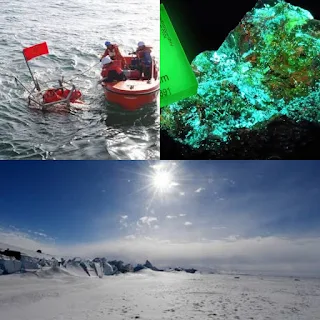Chinese chemists have created a special porous material based on aromatic hydrocarbons, each gram of which can extract 12.6 mg of uranium in three weeks.
ACS Central Science notes that this opens the way to extracting uranium using electrochemical methods from the waters of the World Ocean.
The researchers say: “We created porous scaffolds based on aromatic molecules that can be produced and deposited on a flexible carbon substrate using electropolymerization technology. Each gram can extract 12.6 mg of uranium from seawater within three weeks, paving the way for “electrochemical uranium extraction.” From the waters of the World Ocean.
A team of Chinese chemists headed by Professor Zhao Rui, from Northwestern University in Changchun, created this material while studying the properties of porous aromatic frameworks, which are similar in structure to honeycomb cells and are composed of molecules of aromatic organic compounds.
The researchers point out that the large number of pores and specific surface area of these materials made them think about the possibility of using them in extracting uranium ions from seawater, where. According to current scientists' estimates, the World Ocean contains about a thousand times more reserves of this element than are available to humans on Earth.
It became clear to the scientific team that this is possible with the help of the PAF-144-AO material they invented, which consists of two types of aromatic molecules, (NCP and TCB), which combine automatically under the influence of electric current and form a porous structure. When combined with hydroxylamine, it is able to capture uranyl ions (UO2++) and convert them into insoluble uranium compounds at a low current passed through the filter.
American report: The summer of 2023 was the warmest in the Arctic
The average summer temperature in the Arctic has risen to 6.4 degrees, the highest since temperature monitoring began in 1900.
The US National Oceanic and Atmospheric Administration (NOAA) report stated: “Surface air temperatures in the summer of 2023 were the highest ever recorded in the Arctic, and the highest point of the Greenland ice sheet melted for the fifth time in a 34-year period.”
According to NOAA data, since 1940 average annual temperatures in the Arctic have risen by 0.25 degrees per decade, and average summer temperatures have risen by 0.17 degrees per decade.
The report notes that warming ocean and land temperatures due to human activity are affecting people, ecosystems and communities across the Arctic, which is warming faster than any other part of the world.
It is noteworthy that the World Meteorological Organization of the United Nations announced in early September that the summer of 2023 was the hottest on record.




Good
ReplyDelete